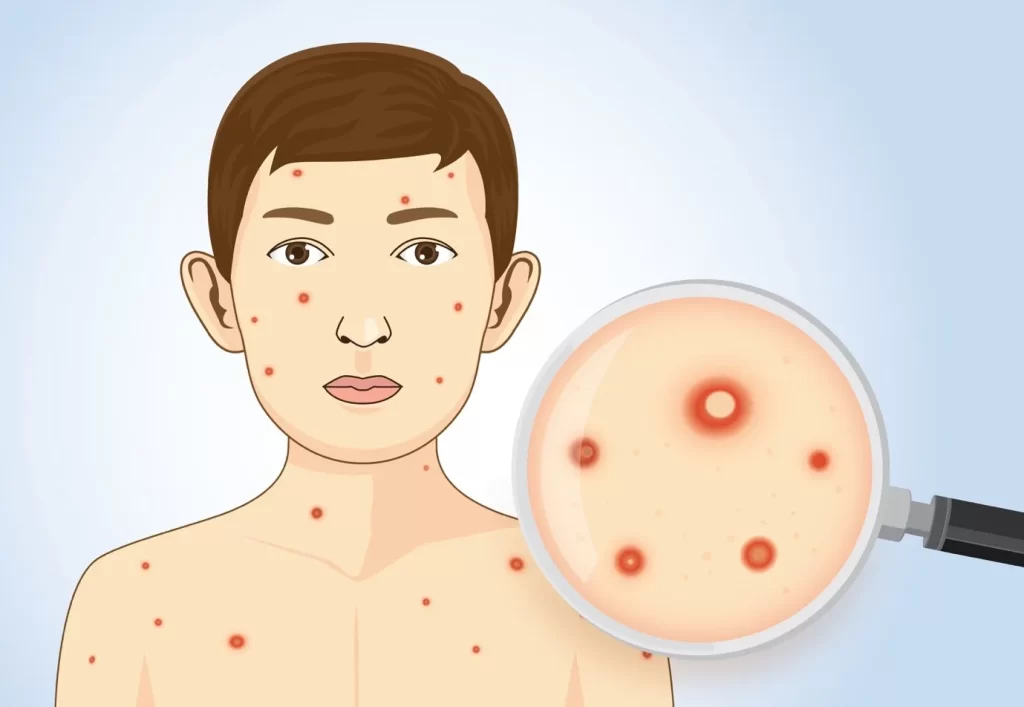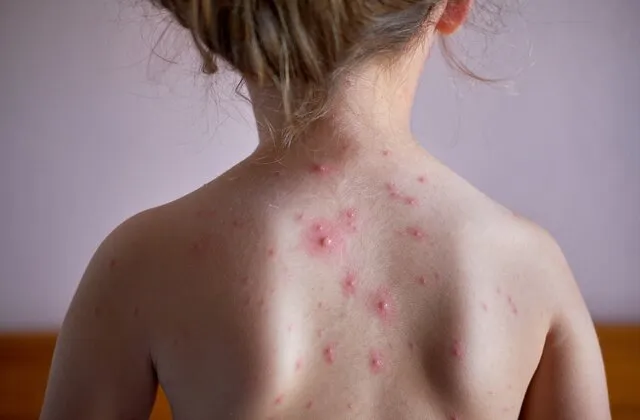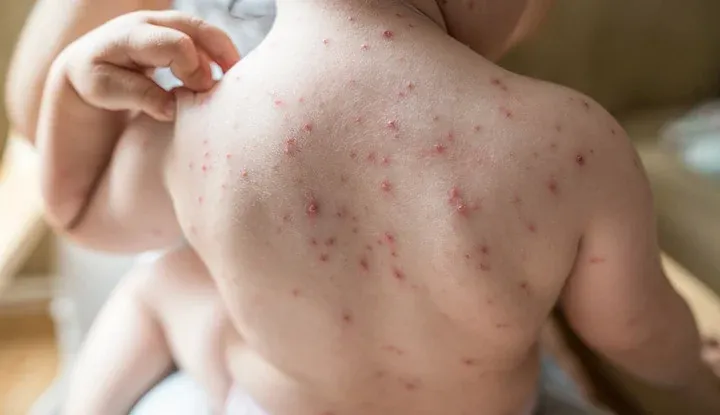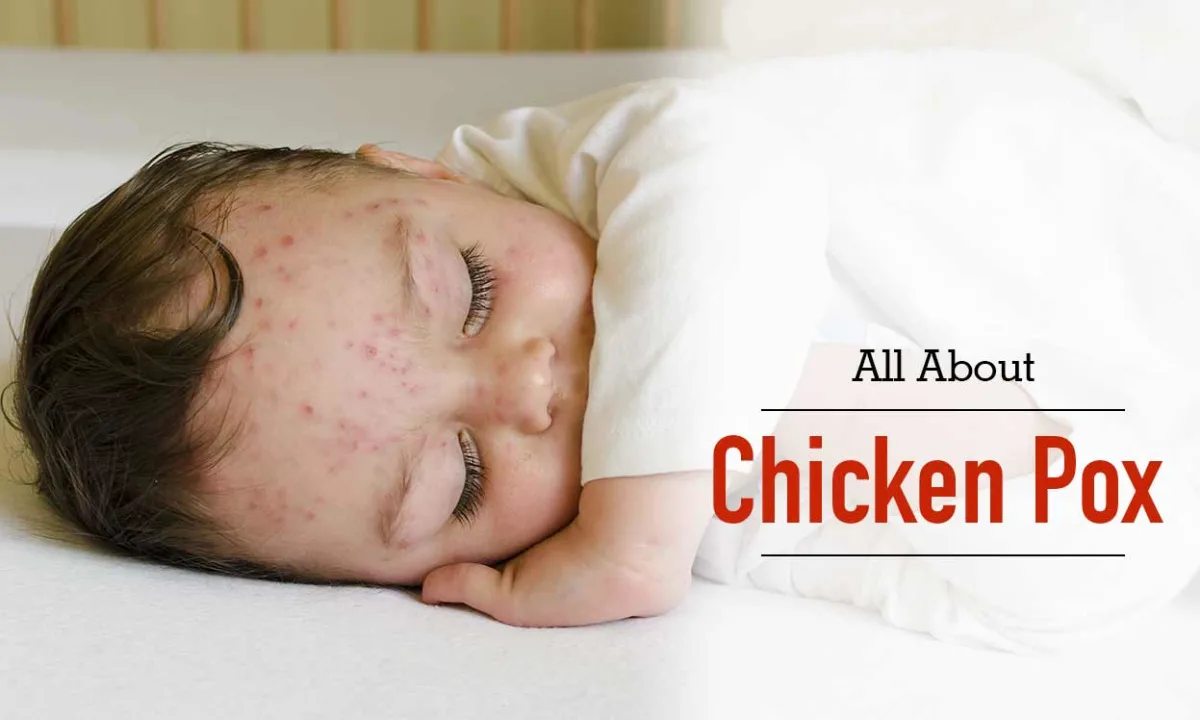Introduction
Chicken pox, a contagious disease synonymous with childhood, is more than just an itchy inconvenience. But what exactly happens when you contract this virus? Does it begin with a fever, or does the characteristic rash come first? Can adults get chicken pox, and if so, is it more severe? Let’s delve into the ins and outs of this commonplace illness.
Table of Contents
Chicken Pox Symptoms
Ever wondered, “What are the first signs of chicken pox?” The answer might surprise you. Chicken pox often begins subtly, with a fever, headache, or just feeling generally unwell. And it’s only after these initial symptoms that the infamous rash typically emerges. So, if you thought it all begins with red spots, think again!
How long do these irritating blisters last? It can vary, but the blisters usually crust over within a week. But let’s address the elephant in the room: can chicken pox cause complications in adults? Yes, unfortunately, adults can face more severe symptoms and potential complications such as pneumonia or brain inflammation. A clear case of better late than never does not apply here.
Chicken Pox Prevention
The saying “prevention is better than cure” definitely rings true when it comes to chicken pox. So, how can we prevent this viral ailment that has been a rite of passage for so many children worldwide?
The most effective way to prevent chicken pox is through vaccination. The chicken pox vaccine, also known as the varicella vaccine, has been available since the mid-1990s and has proven to be highly effective at reducing the incidence and severity of the disease.
The vaccine is made from a live but weakened form of the Varicella-Zoster virus, which stimulates your immune system to produce a defense response. This response includes creating antibodies that will fight off the real virus if you’re exposed to it later.
The Centers for Disease Control and Prevention (CDC) recommends a two-dose schedule for the chicken pox vaccine. The first dose is usually given when the child is between 12 and 15 months old, and the second dose is given between 4 and 6 years of age. These timings may vary depending on the national vaccination schedules in different countries.
But what if you missed these windows? It’s not too late. Older children and adults who haven’t had chicken pox or been vaccinated should also consider getting the vaccine. This is particularly important for people who are at a higher risk of complications from chicken pox, such as healthcare workers, teachers, childcare workers, and people who live or work in a place where transmission is likely.
So, you might wonder, “Is the chicken pox vaccine effective?” Well, two doses of the vaccine are about 90% effective at preventing chicken pox. If a vaccinated person does get chicken pox, it’s usually a milder form with fewer blisters and minimal fever. The vaccine also reduces the risk of complications and the risk of the person transmitting the virus to others.
But there’s a slight catch – “Can you get chicken pox even after vaccination?” Yes, you can. This is called breakthrough varicella. It’s usually mild and less contagious than chicken pox in a person who hasn’t been vaccinated. Breakthrough varicella tends to occur more often in people who received only one dose of the vaccine as opposed to the recommended two.
In addition to vaccination, it’s also important to practice good hygiene habits such as washing hands regularly and avoiding close contact with people who have chicken pox. This is particularly crucial for people who cannot get vaccinated, such as pregnant women and individuals with weakened immune systems.
Remember, even though chicken pox is often seen as a childhood illness, it can be serious and lead to severe complications, particularly in adults, infants, pregnant women, and people with weakened immune systems. Thus, prevention through vaccination and hygiene practices is the key to keep chicken pox at bay.
Chicken Pox Treatment
Once chicken pox has made its unwelcome arrival, you might wonder how to alleviate its symptoms and speed up the healing process. While there isn’t a cure for chicken pox, there are various treatments available to manage the symptoms and prevent complications.
Symptomatic Treatment
The most common symptoms of chicken pox are a red, itchy rash, fever, and general malaise. Treatment is primarily aimed at relieving these symptoms and making you or your child more comfortable.
Fever and Discomfort
Over-the-counter medications like acetaminophen (Tylenol) can help reduce fever and alleviate any discomfort. Non-steroidal anti-inflammatory drugs (NSAIDs), like ibuprofen, can also be used in adults and children over three months, unless advised otherwise by a healthcare professional. Importantly, aspirin should never be given to children with chicken pox due to the risk of Reye’s syndrome, a rare but serious condition that can affect the liver and brain.

Itchiness
Managing the itchiness caused by the chicken pox rash is an important part of treatment. Scratching the blisters can lead to infection, scarring, and in severe cases, sepsis. To alleviate the itch, several measures can be employed:
- Cool Baths: Lukewarm or cool baths can help soothe the skin. Adding baking soda or uncooked oatmeal to the bath water may provide additional relief.
- Tlotsa body cream: This over-the-counter lotion can be applied to the rash to help reduce itchiness.
- Antihistamines: Oral antihistamines, such as diphenhydramine (Benadryl), can help control itching. Always follow the dosing instructions and don’t use topical antihistamine creams or lotions as they can sometimes make the itching worse.
- Loose Clothing: Wearing loose, light clothing can also help prevent irritation and minimize itching.
Antiviral Medication
In healthy children, chicken pox is typically mild and doesn’t require antiviral treatment. However, antiviral medication can be prescribed in certain cases to shorten the duration of the infection and reduce the severity of symptoms. The antiviral drug acyclovir is commonly used, and it’s most effective if started within 24 hours of the rash appearing.
Antiviral treatment is usually recommended for:
- People with severe or complicated chicken pox.
- Adults and adolescents, who are more likely to develop severe symptoms.
- People with weakened immune systems.
- Pregnant women.
Avoiding Spread
Chicken pox is highly contagious. If you or your child has chicken pox, it’s important to stay at home until all the blisters have scabbed over to avoid spreading the virus to others. This usually takes about one week.
While chicken pox can be an uncomfortable experience, most people recover with rest and symptomatic treatment. However, complications can occur, particularly in adults, babies, pregnant women, and those with weakened immune systems, so it’s important to seek medical advice if you’re in one of these high-risk groups. And remember, the best way to avoid having to deal with chicken pox treatment is to prevent it through vaccination.
Chicken Pox and Pregnancy
Chicken pox (varicella) during pregnancy can pose serious risks not only to the mother but also to the unborn baby. For this reason, understanding the potential implications and knowing how to protect yourself is of utmost importance.
Risks to the Mother
Pregnant women who get chicken pox may experience severe symptoms than they might have if not pregnant. They are more likely to develop pneumonia, a serious lung infection, and have a higher risk of other complications, including death. Other complications include skin infections, inflammation of the brain (encephalitis), and problems with the liver or kidneys.
Risks to the Baby
If a pregnant woman gets chicken pox during pregnancy, the virus can be transmitted to the unborn baby. The potential risks to the baby depend largely on the timing of the infection.
- First and early second trimester (up to 20 weeks): If a woman gets chicken pox during the first 20 weeks of pregnancy, the baby faces a risk of congenital varicella syndrome. This syndrome is characterized by birth defects, including skin scarring, limb underdevelopment, brain abnormalities, vision and hearing problems, and low birth weight. However, it’s important to note that this risk is relatively low, estimated at 0.4% to 2%.
- Between 20 and 36 weeks: Babies infected during this period don’t usually suffer from birth defects, but the virus may stay dormant in their bodies and potentially reactivate later in life as shingles.
- Late pregnancy and around the time of birth: If a woman gets chicken pox in the week before giving birth or shortly after, there’s a risk that the newborn could have neonatal varicella, a severe, life-threatening form of the disease. This is because the baby doesn’t have enough time to receive antibodies from the mother before birth.
Prevention and Management
The best way to prevent chicken pox during pregnancy is to ensure you’re immune before you get pregnant. If you’re planning to become pregnant and you haven’t had chicken pox or been vaccinated, talk to your healthcare provider about getting the chicken pox vaccine. The vaccine is given in two doses, four to eight weeks apart, and it’s recommended to wait at least one month after the final dose before becoming pregnant.
If you’re already pregnant and aren’t sure whether you’re immune, a blood test can check for antibodies against the varicella virus. If you’re not immune, avoid contact with people with chicken pox or shingles. If you do get exposed to the virus, contact your healthcare provider right away. You may be given varicella-zoster immune globulin (VZIG), a blood product that can reduce the severity of chicken pox. VZIG works best if given within 96 hours after exposure.
If you develop chicken pox while pregnant, your healthcare provider may prescribe antiviral medication to reduce the severity and duration of the disease.

Finally, if you’re not immune and you give birth within seven days before or after developing a rash from chicken pox, your newborn may be given VZIG at birth to prevent severe neonatal varicella.
Postpartum Vaccination
If you weren’t immune during pregnancy, it’s recommended to get the chicken pox vaccine before you leave the hospital or birthing center to protect you from future infections and ensure you can’t pass the virus to your baby. The vaccine is safe for breastfeeding women.
While chicken pox can pose risks to both the mother and baby during pregnancy, appropriate precautions and prompt management can significantly reduce these risks. Always consult your healthcare provider if you’re pregnant or planning to become pregnant and have concerns about chicken pox.
Chicken Pox and Children
Chicken pox, also known as varicella, has long been associated with childhood. Many adults remember having it as kids, complete with itchy red spots and days off from school. However, with the advent of the varicella vaccine, fewer children now experience this once-common illness. Nevertheless, it’s important to understand chicken pox, its symptoms, how it affects children, and how it can be prevented.
Symptoms and Signs in Children
Chicken pox in children usually starts with fever, tiredness, headache, and loss of appetite. A day or two later, the characteristic chicken pox rash begins to appear. It starts as small, itchy, red spots that develop into fluid-filled blisters which later crust over to form scabs. These spots typically appear on the chest, back, and face, and can then spread to the rest of the body.
Children may also experience some discomfort or feel unwell, but younger children often have a milder illness than adolescents or adults. The itchiness of the rash can be distressing, and it’s important to try and discourage children from scratching to prevent the spots from becoming infected and to minimize scarring.
When to See a Doctor
While chicken pox is usually a mild disease, there are times when it’s important to seek medical advice. If your child has a weakened immune system, or if they develop any of the following symptoms, you should contact a healthcare professional:
- Severe skin pain and redness around the spots or blisters
- High fever, severe cough, difficulty breathing, or chest pain (these could be signs of complications such as pneumonia)
- Severe headache, sensitivity to light, drowsiness or confusion, neck stiffness, or difficulty walking (these could be signs of neurological complications)
- Vomiting, severe abdominal pain, or difficulty urinating (these could be signs of other complications)
Contagiousness and Exclusion from School
Chicken pox is highly contagious. It spreads easily through coughs and sneezes, or by touching the fluid from the blisters. A person with chicken pox is contagious from one to two days before the rash appears until all the blisters have crusted over. This typically takes about five to seven days after the onset of the rash.
If your child has chicken pox, you should inform their school or daycare. They’ll need to stay home to avoid spreading the virus to others. Most schools and daycares require children with chicken pox to stay home until all their blisters have dried and crusted over.
Chicken Pox and the Varicella Vaccine
The best way to protect children from chicken pox is with the varicella vaccine. It’s recommended for children under 13 years of age and is given in two doses: the first at 12 to 15 months and the second at 4 to 6 years. The vaccine is very effective at preventing severe disease. If a vaccinated child does get chicken pox, they usually have a milder form with fewer spots and milder fever.
Even though chicken pox is often seen as a routine part of childhood, it can occasionally cause serious complications. By being aware of the symptoms and ensuring your child is vaccinated, you can help protect them from this itchy and potentially serious disease.
Chicken Pox and Adults
While chicken pox is most commonly associated with childhood, it can indeed occur in adults. In fact, adult chicken pox tends to be more severe and can lead to serious complications. This makes understanding the illness, how to prevent it, and what to do if you suspect you have it, especially crucial for adults.

Symptoms and Severity in Adults
Chicken pox in adults presents similarly to that in children, beginning with symptoms such as fever, headache, tiredness, and loss of appetite. This is soon followed by the distinctive itchy rash that starts as red spots and progresses into fluid-filled blisters, which then scab over.
However, adults with chicken pox usually experience more severe symptoms than children. They are more likely to have a high fever and feel severely unwell. The rash can also be more extensive and painful. The illness also tends to last longer in adults than in children.
Complications
Adults are more likely to develop serious complications from chicken pox. These can include:
- Pneumonia: This is the most common complication in adults, characterized by cough, chest pain, and difficulty breathing.
- Skin infections: Scratching the blisters can lead to bacterial skin infections.
- Encephalitis: This is an inflammation of the brain which can lead to confusion, seizures, and even loss of consciousness.
- Hepatitis: An inflammation of the liver can occur, leading to jaundice (yellowing of the skin and eyes) and other symptoms.
Given the risk of these complications, adults who develop chicken pox should seek medical advice.
Prevention: The Varicella Vaccine
The best way to prevent chicken pox in adults is the same as for children: vaccination. The varicella vaccine is recommended for adults who have never had chicken pox and are not already immune. This is particularly important for those who work in healthcare or in a setting with young children, as these individuals are more likely to be exposed to the virus.
The vaccine is also strongly recommended for women of childbearing age who are not already immune, as chicken pox can cause serious complications during pregnancy.
What to Do if You’re an Adult and Suspect You Have Chicken Pox
If you’re an adult and suspect you have chicken pox, you should contact a healthcare professional for advice. Because of the risk of complications, it’s important to get a diagnosis and appropriate treatment.
Avoid contact with others, especially individuals who may be particularly vulnerable to severe disease, such as pregnant women, newborns, and people with weakened immune systems, until all your chicken pox blisters have crusted over.
While chicken pox is less common in adults than in children, it poses a higher risk of severe disease and complications. Therefore, understanding the symptoms, knowing how to respond, and taking steps to prevent the disease through vaccination are essential.
Chicken Pox and Shingles
Chicken pox and shingles are both caused by the varicella-zoster virus (VZV). Understanding the relationship between these two diseases is essential, especially since anyone who has had chicken pox can potentially develop shingles later in life.
The Link Between Chicken Pox and Shingles
Chicken pox is usually a mild disease that occurs during childhood, characterized by an itchy rash of blisters. After someone recovers from chicken pox, the varicella-zoster virus doesn’t leave the body. Instead, it lies dormant in the nerve cells, typically causing no problems for many years.
However, the virus can reactivate, particularly when the immune system is weakened due to factors like aging, stress, or certain illnesses and medications. When this happens, it causes shingles – a painful rash that typically affects one side of the body.
Symptoms and Complications of Shingles
Shingles usually starts with pain, itching, or tingling in an area where a rash then develops. The rash consists of blisters that scab over in about 7 to 10 days and clear up within 2 to 4 weeks. Other symptoms can include fever, headache, fatigue, and sensitivity to light.
The most common complication of shingles is postherpetic neuralgia (PHN), a long-lasting pain that persists in the area where the rash was even after the rash clears up. This can be severe and debilitating, and it’s more common in older individuals.
Other complications can include vision problems (if the shingles rash is around the eye), skin infections, neurological problems, and, rarely, stroke.
Can You Get Shingles If You’ve Never Had Chicken Pox?
Yes, but it’s less common. If you’ve been vaccinated against chicken pox, you’re less likely to get chicken pox and subsequently shingles. However, since the vaccine uses a live, weakened version of the varicella-zoster virus, it’s theoretically possible (though rare) to get shingles following vaccination.
On the other hand, if you’ve never had chicken pox or the vaccine, you’re susceptible to chicken pox, which can be more severe in adults. And once you’ve had chicken pox, you can potentially develop shingles later on.
Prevention: The Shingles Vaccine
While having chicken pox as a child leaves you susceptible to shingles in adulthood, there are shingles vaccines that can significantly reduce this risk. These vaccines are recommended for adults over the age of 50, regardless of whether they remember having had chicken pox.
The shingles vaccine is also beneficial in reducing the likelihood of developing postherpetic neuralgia (PHN), the painful complication of shingles. It’s important to note that even if you’ve already had shingles, you can still receive the shingles vaccine to help prevent future occurrences of the disease.
Chicken pox and shingles are closely related, their impact on our health varies significantly. Vaccination is a key tool in preventing both diseases and their potential complications. If you’re over 50 or have a weakened immune system, speak to your healthcare provider about the shingles vaccine.
Chicken Pox and Immunity
Immunity is a key concept in understanding chicken pox and its potential complications. Once you’ve had chicken pox, you usually develop immunity to the disease, meaning that it’s rare to get it again. However, the virus doesn’t leave your body, and it can resurface years later as shingles. Understanding how immunity works in relation to the varicella-zoster virus is important in protecting yourself and others from these diseases.
Natural Immunity
Natural immunity to chicken pox occurs after you’ve been infected with the disease. The immune system fights off the infection and then keeps a memory of the virus, which helps protect you if you’re exposed again. However, this immunity is not 100%—there are rare cases where a person might get chicken pox more than once.
Immunity After Vaccination
Immunity can also develop after vaccination. The chicken pox vaccine contains a weakened version of the varicella-zoster virus that helps your immune system learn how to fight the virus without causing the full-blown disease. This immunity is not lifelong, and its effectiveness can decrease over time. However, if a vaccinated person does get chicken pox, it’s usually a milder case.
Two doses of the vaccine are about 94% effective at preventing chicken pox altogether and even more effective at preventing severe disease.
Does Having Chicken Pox or the Vaccine Prevent Shingles?
While having chicken pox gives you immunity against another chicken pox infection, it doesn’t protect you from shingles. This is because shingles occurs when the varicella-zoster virus that caused chicken pox reactivates in your body.
The chicken pox vaccine can also help prevent shingles. This is because the vaccine uses a weaker strain of the varicella-zoster virus than the one causing natural infection, making it less likely to reactivate as shingles.
However, for adults who have already had chicken pox, there’s a separate shingles vaccine that can help prevent this painful rash.
Immunity and Public Health
Understanding immunity to chicken pox also has important implications for public health. Widespread immunity in a community, often referred to as herd immunity, can protect people who are unable to get vaccinated, such as newborns and those with weakened immune systems. This is achieved by a large portion of the population being vaccinated, reducing the overall amount of the virus that’s able to spread in the community.
Immunity is a complex but critical factor in preventing chicken pox and shingles. It’s not foolproof, but with proper vaccination, it’s possible to significantly reduce the risk and severity of these diseases.
Chicken Pox Transmission
Chicken pox, caused by the varicella-zoster virus, is a highly contagious disease. Understanding how the virus spreads is essential to preventing infection and protecting vulnerable individuals.
How is Chicken Pox Spread?

Chicken pox is typically transmitted through direct contact with an infected individual. The virus spreads in the following ways:
- Airborne Transmission: When an infected person coughs or sneezes, they release tiny droplets into the air. These droplets can carry the virus, which can then be inhaled by others in the vicinity.
- Direct Contact: The fluid inside the blisters of an infected person contains the varicella-zoster virus. If a person touches the fluid and then touches their face, particularly their mouth or nose, they can become infected.
- Contact with Contaminated Objects: If an infected person touches objects or surfaces (for example, after scratching their blisters), the virus can be transferred. If another person touches the same objects and then touches their face, they can get chicken pox.
When is a Person With Chicken Pox Contagious?
People with chicken pox are most contagious from 1-2 days before the rash appears until all the blisters have crusted over. This typically takes about 5-10 days. It’s recommended that individuals with chicken pox stay away from school, work, and public places until all their blisters have crusted over to avoid spreading the virus.
Can You Get Chicken Pox from Someone with Shingles?
Interestingly, you can get chicken pox from being in direct contact with the blister fluid from a person with shingles, as shingles is caused by the same virus. However, a person with shingles cannot spread shingles to others. Shingles can only develop in a person who has already had chicken pox or been vaccinated for it.
Prevention of Transmission
Vaccination is the best way to prevent chicken pox transmission. The vaccine is not only highly effective at preventing chicken pox, but even if a vaccinated person does get chicken pox, the illness is usually milder and they are less likely to spread the virus to others.
People who are infected should avoid contact with individuals who are particularly at risk of serious complications, such as infants, pregnant women, and individuals with weakened immune systems.
Understanding chicken pox transmission is crucial in implementing effective measures to prevent its spread. This includes maintaining personal hygiene, isolating during infection, and most importantly, getting vaccinated.
Chicken Pox and Public Health
Chicken pox has significant implications for public health. As a highly contagious disease, it can spread rapidly within communities and can pose serious risks to certain population groups. Public health strategies, therefore, focus on surveillance, vaccination programs, and public education to control the spread of chicken pox.
Surveillance
Surveillance is a key aspect of public health management of chicken pox. Health departments track cases of chicken pox to understand how the disease is spreading within the community. This can help identify outbreaks, monitor the effectiveness of vaccination programs, and inform public health strategies.
Health departments typically collect data on the number of cases, hospitalizations, and any complications or deaths associated with chicken pox. This information is crucial in guiding the allocation of resources and the implementation of preventative measures.
Vaccination Programs
Vaccination is the most effective strategy for preventing chicken pox and is a core component of public health programs. Widespread vaccination not only protects vaccinated individuals but also contributes to herd immunity, indirectly protecting individuals who cannot be vaccinated, such as newborns and those with weakened immune systems.
The World Health Organization (WHO) recommends that a country which introduces the chickenpox vaccine into its routine immunization schedule should aim to cover at least 80% of the target population to prevent a possible increase in the age of primary infection.
Public Education
Educating the public about chicken pox is another important aspect of public health management. This includes providing information about the symptoms of chicken pox, how it spreads, the importance of vaccination, and what to do if someone becomes infected.
Public education can also focus on dispelling myths and misconceptions about chicken pox and the vaccine. This is crucial in encouraging vaccination and promoting behaviors that prevent the spread of the disease.
Managing Outbreaks
In the event of a chicken pox outbreak, public health departments play a crucial role in controlling the spread. This can involve identifying and isolating cases, ensuring that contacts of infected individuals are vaccinated or immune, and providing guidance to schools, healthcare facilities, and the wider community.
The Role of Vaccinations in Controlling Chicken Pox at a Community Level
Widespread vaccination is key to controlling chicken pox at a community level. Vaccination reduces the number of people who can become infected and spread the virus, disrupting the chain of transmission. This is especially important in protecting vulnerable groups such as infants, pregnant women, and those with weakened immune systems, who are at higher risk of severe complications from chicken pox.
Managing chicken pox from a public health perspective involves a multifaceted approach, including surveillance, vaccination, education, and outbreak management. These strategies work together to reduce the incidence and impact of chicken pox, protecting individual health and the health of the community.
FAQ’s
In the pursuit of understanding chicken pox, treatment as well as how to prevent it in the unique context of South Africa, many questions frequently arise. To address these inquiries, we’ve compiled a list of the 10 most commonly asked questions about this subject.
What is chickenpox?
Chickenpox is a highly contagious viral infection that causes an itchy, blister-like rash. It is caused by the varicella-zoster virus (VZV).
How is chickenpox spread?
Chickenpox is spread through the air by respiratory droplets produced when an infected person coughs or sneezes. It can also be spread through contact with the fluid from the blisters or by touching the scabs that form after the blisters have crusted over.
What are the symptoms of chickenpox?
The symptoms of chickenpox usually appear 10-21 days after exposure to the virus. The most common symptoms are:
Fever
Rash
Itchiness
Headache
Muscle aches
Fatigue
How is chickenpox diagnosed?
Chickenpox is usually diagnosed based on the symptoms. In some cases, a doctor may order a blood test to confirm the diagnosis.
How is chickenpox treated?
There is no specific treatment for chickenpox. The goal of treatment is to relieve symptoms and prevent complications. Treatment may include:
Antiviral medication
Antihistamines to relieve itching
Calamine lotion or oatmeal baths to soothe the skin
Pain relievers, such as ibuprofen or acetaminophen
Plenty of fluids to stay hydrated
How long does chickenpox last?
The chickenpox rash usually appears in stages over a period of 3-5 days. The blisters will crust over and fall off within 7-10 days. The fever usually lasts 3-5 days.
How can I prevent chickenpox?
The best way to prevent chickenpox is to get vaccinated. The chickenpox vaccine is given in two doses, at 12-15 months of age and again at 4-6 years of age.
What are the complications of chickenpox?
The most common complications of chickenpox are:
Bacterial infections of the skin
Pneumonia
Encephalitis (inflammation of the brain)
Shingles (a reactivation of the varicella-zoster virus)
Who is at risk for serious complications from chickenpox?
People who are at risk for serious complications from chickenpox include:
Babies
Adolescents
Adults
People with weakened immune systems
Pregnant women
What should I do if I think I have chickenpox?
If you think you have chickenpox, it is important to see a doctor right away. The doctor can confirm the diagnosis and make sure you receive the appropriate treatment.
We hope this list offers you valuable insights into chicken pox. By addressing these common questions, we aim to assist you in your journey towards a healthier heart and overall wellbeing.
Conclusion
Chicken pox, caused by the varicella-zoster virus, is a common and highly contagious disease that has been a significant public health concern for centuries. Through a comprehensive exploration of various facets of this illness, it becomes evident that understanding its dynamics is crucial in mitigating its impact.
From recognizing the initial symptoms to knowing when to seek medical help, an awareness of the disease’s progression can potentially prevent severe complications. It’s essential to know that while chicken pox is typically mild in children, it can lead to more serious complications in adults and pregnant women, stressing the importance of early detection and medical intervention.
Prevention, primarily through vaccination, is the most effective tool in combating chicken pox. It not only provides individual immunity but also contributes to the broader community immunity, protecting those who cannot receive the vaccine themselves.
Understanding the risk of shingles, a painful condition caused by the reactivation of the dormant chicken pox virus, is another important aspect of managing your health. Particularly for adults who have had chicken pox, getting the shingles vaccine is a crucial preventative measure.
Moreover, appreciating the interplay between chicken pox and public health can encourage community engagement and cooperation in vaccination campaigns and outbreak management. This is especially pertinent given the ongoing need to protect vulnerable population groups, maintain community health, and manage healthcare resources effectively.
In conclusion, the fight against chicken pox is one that requires both personal and community effort. Whether you’re an individual, a parent, or a community member, equipping yourself with this knowledge is a vital step towards protecting not only your health but also the health of those around you. It illustrates that when it comes to chicken pox, knowledge truly is the most potent vaccine.


